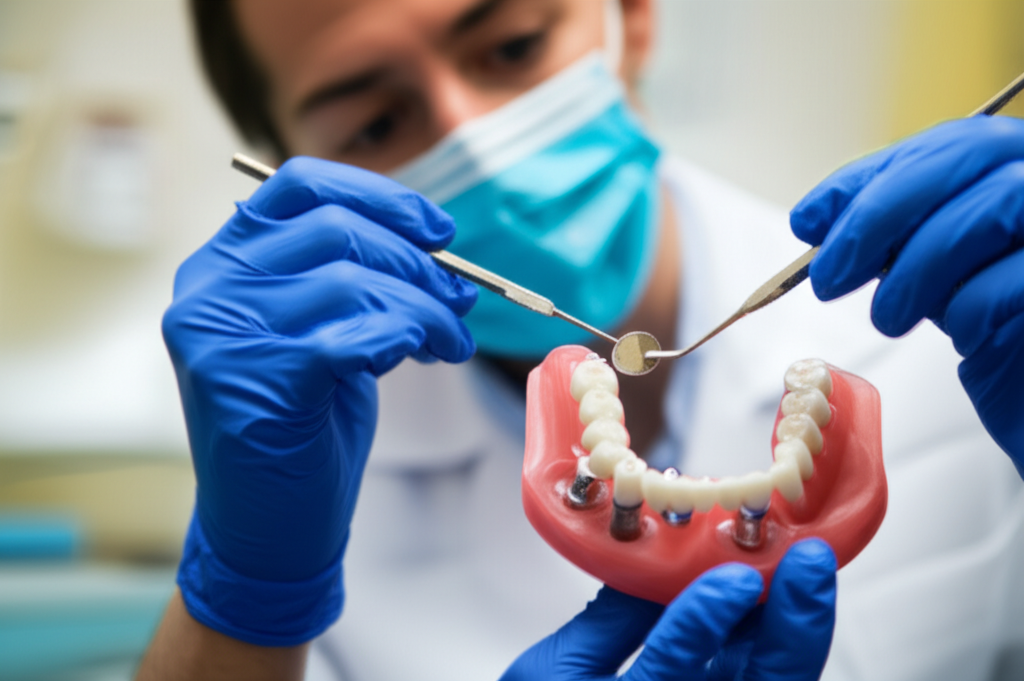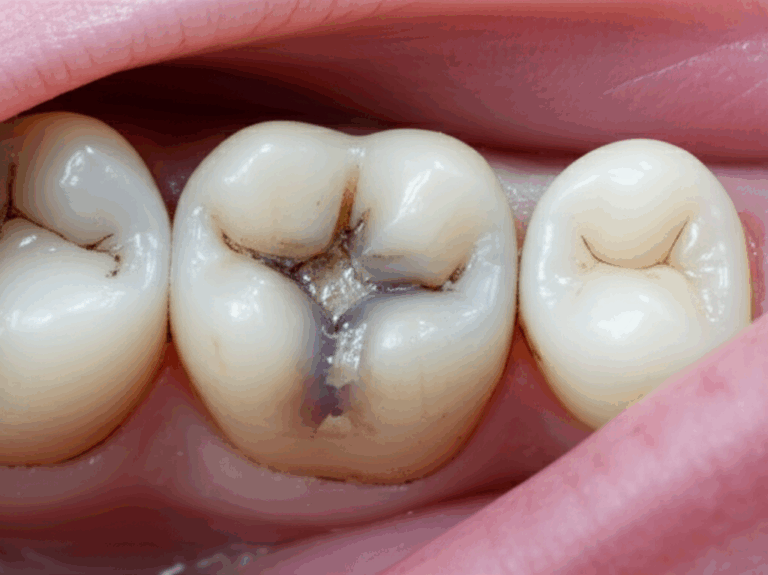
Can a Dentist Do an Implant? Understanding Who Performs Dental Implant Procedures
Have you ever sat in your dentist’s chair, nervously tapping your fingers, and wondered, “Can my regular dentist actually do a dental implant, or do I need to see a specialist?” You’re not alone. Lots of people ask this, and it’s a smart question—choosing the right person for the job really matters for your future smile.
Dental implants are now the best way to replace missing teeth because they work well and feel natural. Still, getting an implant isn’t something every dentist does the same way. There’s a lot going on behind that new tooth—training, experience, and sometimes a team of people. If you’re not sure whether your usual dentist can help, or if you need to see a different expert, don’t worry—you’ll know more by the end of this article.
Let’s break it all down, from who does what, to how the implant works, and how to make the best choice for you.
In This Article
- Who Really Does Dental Implants?
- Understanding Dental Implant Training & Qualifications
- The Dental Implant Process, Step by Step
- How to Choose the Right Dentist for You
- Success Rates, Risks, and Why Provider Choice Matters
- Key Takeaways: Making a Confident, Healthy Choice
Who Really Does Dental Implants?
Why This Question Matters
If you need a dental implant, you probably want to stick with your regular dentist—someone you know and trust. It can feel safer and maybe even easier or cheaper. But here’s the deal: some dentists do implants, but not all have the same extra training, and sometimes seeing a specialist is just safer.
Let’s Untangle the Roles
Think of the dental world like a team sport. Sometimes, working together is best. Here’s who might be on your team:
General Dentists: Your Everyday Dentist
A general dentist is your main dental doctor. They do checkups, fillings, and talk to you about fixing missing teeth.
- Implant Placement: Some general dentists with extra hands-on training can put in dental implants, but mostly in easy cases.
- Restorative Phase: Almost all general dentists put the crown or denture (the top part you see) on the implant once it’s healed.
Important: Not every general dentist feels comfortable or is trained to do the surgery part. If your dentist wants to refer you to a specialist, it’s because they care about your safety.
Oral and Maxillofacial Surgeons: Surgery Experts
Oral surgeons are highly trained—in school for 4–6 more years! They handle tough surgeries, wisdom teeth, and face or jaw problems.
- Complicated or Risky Cases: If you need extra work like a bone repair or sinus lift, or if your jaw shape is tricky, oral surgeons are the safe choice.
Periodontists: Gum and Bone Experts
Periodontists focus on your gums and the bone under your teeth.
- Best for Gum and Bone Problems: If you have gum disease or bone loss, a periodontist knows just what to do.
Prosthodontists: Specialists in Restoring Teeth
When you have a difficult situation (like several missing teeth or bite issues), prosthodontists plan and design the finished crowns or bridges. Some also put in implants if they have extra implant training.
“Implantologist”: What Does That Mean?
This isn’t an official specialist. An “implantologist” is just a dentist—sometimes a general dentist, sometimes a specialist—who’s taken lots of extra implant classes. It shows they do a lot of implants, but you should still ask about their training and experience.
Understanding Dental Implant Training & Qualifications
You wouldn’t let just anyone work on your house wiring, would you? Dental implants also need special skills. Here’s how dentists get those skills:
The Training Path
- Dental School: All dentists get the basics—think of it as learning to fix most problems in your mouth.
- Residency (Specialists): Oral surgeons, periodontists, and prosthodontists take 3–6 more years to learn surgery or tooth replacement in detail.
- Continuing Education (CE): General dentists who want to do implants go to hands-on courses and get regular updates. They usually need at least 100–300 hours of extra training.
Signs Your Dentist Has Done the Work
- Certificates from well-known groups, like the American Academy of Implant Dentistry (AAID) or International Congress of Oral Implantologists.
- Belongs to professional implant groups (dentists who keep learning are good!).
- Shows before-and-after cases and real patient feedback.
- Answers your questions clearly—without using words you don’t understand.
Why Training Counts
Dental implants work by fusing with your jawbone. If not done right, things can go wrong (infection, nerve problems, failed implant). Dentists with the right training use good planning tools (like 3D scans) and safe steps.
The Dental Implant Process, Step by Step
Let’s make this big process super simple. Here’s what usually happens:
1. Consultation and Planning
- Health Check: Your dentist will talk about your health, including things like diabetes or smoking, which change how you heal.
- X-rays and 3D Scans: They look at your jawbone and map out the area.
- Your Plan: You’ll see the step-by-step plan—sometimes just one dentist, sometimes a whole team.
2. Putting in the Implant
- Surgery Time: The implant is a small metal or ceramic screw that goes into your jaw.
- Who Does It?: Easy cases—maybe a trained general dentist. Tougher situations—best with a specialist.
- Numbing and Comfort: They use numbing medicine, sometimes sleepy medicine, so you don’t feel anything.
3. Healing: Bonding to the Bone
- What’s Going On?: Over 3–6 months, your bone grows around the implant like a tree root grabbing the soil.
- Be Patient: Going too fast can cause the implant to fail.
4. Your New Tooth
- Abutment: A small connector piece gets attached to the implant.
- Crown or Denture: A custom-made crown or denture is put on top, making your smile whole. Your regular dentist or a prosthodontist usually does this part.
- Dental Labs: Special labs, like a trusted implant dental laboratory, make the new tooth to fit just right.
How to Choose the Right Dentist for You
Choosing isn’t just about what degrees are on the wall or fancy equipment. It’s about you feeling safe and getting good results.
Start by Asking:
- How many implants have you put in? Experience really matters—ask for numbers.
- What training do you have? Ask about hands-on learning, certifications, and classes.
- Can I see your work or talk to another patient?
- How do you handle tough cases? Good dentists know when to get help or call in a specialist.
- Will you include me in the planning? You should feel like part of the team and understand every step.
How They Treat You Matters
A good dentist will slow down, listen, and explain things in simple words. If something feels off, trust yourself—getting another opinion is totally okay.
Think About Your Case
- Easy Cases: One missing tooth, healthy gums and bone? A well-trained general dentist could do it.
- Tough Cases: Lots of missing teeth, bone loss, or health problems? Go to a specialist, or make sure your dentist works with one.
Teamwork Helps
Sometimes, the best results come when your dentist and a specialist work together—it’s like having the builder and designer build your dream home.
Success Rates, Risks, and Why Provider Choice Matters
Is it really a big deal who does your implant? Let’s see what the numbers say.
Here’s What Happens Most of the Time
- Single tooth implants work 95–98% of the time over 10 years—especially in the lower jaw.
- Specialists do about 75–85% of implants, usually the harder cases.
- General dentists place about 15–25%, often the easier ones.
- Most people (over 90%) are very happy with their new teeth—eating, comfort, looks.
- If you take care of it, an implant can last 20 years or more.
- The crown on top might need to be replaced after 10–15 years.
Possible Problems
- Peri-implantitis (infection around the implant): shows up in 5–10% of cases after a few years, kind of like gum disease for implants.
- Bone loss or sinus trouble: can happen with big repairs or near the cheeks and nose.
- Nerve trouble or numbness: pretty rare, but it can happen if the area isn’t checked carefully.
- Implant doesn’t bond (fails): this usually means the bone didn’t grow to it, or the area got infected.
The lesson: The more trained your dentist is, the fewer problems you’ll likely have. Picking the right person really does matter.
“Who Is This For?” (Are You a Good Candidate?)
Not everyone can get a dental implant right away. Here’s who usually does well:
Good Candidates
- Missing one or more teeth and want something long-lasting.
- Healthy gums and jawbone (or okay with a bone repair surgery).
- Healthy overall: Some medical problems (like hard-to-control diabetes) might mean you need extra steps first.
- Don’t smoke: Smoking slows healing and can cause problems.
- Take care of your teeth: Implants need you to brush, floss, and see the dentist, just like your own teeth.
Who might not be ready?
- Bad, untreated gum disease
- Out-of-control health problems
- Jawbone that’s too thin or soft (but sometimes extra bone can be added)
- Expecting a miracle—implants are great, but not perfect
If you want to learn about other ways to replace teeth, check out a dedicated removable denture lab.
Your Healthy Takeaway: Making a Confident, Empowered Choice
Let’s wrap it up. Here’s what’s most important as you think about an implant:
Key Points to Remember
- Yes, some regular dentists can do implants—but make sure they have lots of training and good results.
- For hard cases, see a specialist (oral surgeon, periodontist, or prosthodontist), or ask about a team approach.
- Ask lots of questions about their training and how many implants they’ve done—the best dentists love to share!
- Implants work really well when planned and done right.
- Brush, floss, and see your dentist for checkups—this keeps your implant healthy, just like real teeth.
What Next?
- Book a chat with your dentist to ask about your choices and what they recommend.
- Listen carefully to their plan—if you’re unsure, ask for another opinion. That’s normal!
- Look into dentists near you who have lots of extra training, or are specialists.
- If you want a special material or custom look, explore places like a dental ceramics lab.
You Deserve a Confident Smile
Remember—a well-done implant can last for years, letting you eat, talk, and smile without worry. The real secret is not just the tools, but the skill and care of the dentist helping you.
So ask your questions. Find the dentist or specialist who makes you feel safe. And get ready for a new, easy smile.
Want to start? Book a visit, see your options, and take the first step toward your confident new grin.
Frequently Asked Questions About Dental Implants
Can any dentist do an implant, or do I always need a specialist?
Some general dentists can, if they have enough training—especially for simple cases. For tougher situations, a specialist is better.
How do I know my dentist is trained for implants?
Just ask about their classes, certificates, and how many implants they have placed. Good dentists are happy to tell you.
Are dental implants safe?
Yes, for most people, and when the person doing it is well trained. Good planning and follow-up keeps things safe.
Is getting an implant very painful?
Usually, people say it’s not as bad as a tooth pulled out. Numbing keeps you comfortable, and most feel okay with some over-the-counter pain pills afterward.
Will my implant look and work like a real tooth?
Yes! The new top part is made just for you, so it fits, chews, and looks like your other teeth. You should be able to eat and smile with confidence.
Still Have Questions?
Your smile is important. If you’re not sure, or just want a second opinion, book a visit with a dentist who cares. With the right plan, you’ll be smiling bright in no time!








